The Best of Bach and Schubert
The Chatham Chorale, accompanied by an orchestra, will present a concert featuring music by two titans of classical music — Johann Sebastian Bach and Franz Schubert — at First Congregational Church of Chatham (650 Main St.) on Saturday, Nov. 18 and Sunday, Nov. 19.
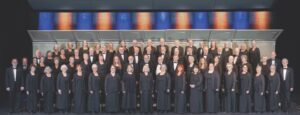
The program will begin with Bach’s cantata Wachet auf, ruft uns die Stimme. The piece is based on a Lutheran hymn by pastor, poet, and composer Philipp Nicolai (1556-1608) and consists of seven movements scored for four-part choir, three soloists (soprano, tenor, and bass), and a baroque instrumental ensemble. First performed in 1731, the music feels timeless: both comfortable and exploratory, delicately ornamented in some moments and comfortingly plain in others. The earnest, smiling theme introduced by violins in the fourth movement (Zion hört) is perhaps one of Bach’s most recognizable melodies.
The Chorale will also perform Franz Schubert’s Mass No. 2 in G Major and his Magnificat in C Major. Over the course of its six movements, the Mass evolves from an exclamation of exuberance to a soft, reverent utterance. Soloists sing in canon, and the fourth movement, Sanctus, stands out for its brief but euphoric fugue. The last movement, Agnus Dei, hums in its careful end, sounding similar to the opening measures of the first movement, Kyrie.
Schubert’s Magnificat contains three movements: the first, a high-spirited Allegro that sounds delighted with itself; the second, a restrained Andante featuring four soloists (soprano, alto, tenor, and bass); and the third, an exultant movement that ends with resounding strikes by the timpani and horns. What could be more magnificent?
The concerts begin at 2 p.m. each day. Tickets are $25 at chathamchorale.org. —Dorothea Samaha
Celebrating Indigenous Voices with Food, Song, and Dance
If more people incorporated traditional Wampanoag knowledge into their lives, asks Leo Blandford, how might that improve their health? And if one’s perspective moved from trying to dominate the natural world to living in concert with it, how might one’s relationship to the environment change?
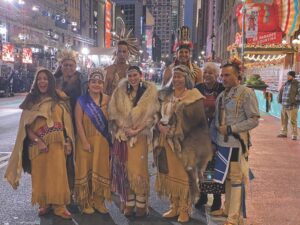
Blandford will moderate “Holistic Healing: Indigenous Voices,” a community discussion, at Wellfleet Preservation Hall (335 Main St.) on Saturday, Nov. 18, 1 p.m. It will be followed by a potluck meal and a participatory music and dance performance led by the Wampanoag Nation Singers and Dancers to celebrate the continuing Wampanoag presence here.
Blandford, a Preservation Hall board member, is director of community-based care at Outer Cape Health Services and Health Equity Committee chair for the MLK Action Team of the Nauset Interfaith Association, which worked with tribe members to create 17 free events this year to share Wampanoag traditions, beliefs, and history.
The focus, says Blandford, has been on the World Health Organization’s definition of “healthy equity,” which he describes as what happens “when everyone can attain their full potential for health and well-being.” But only a part of that involves diseases and the health-care system. “Our health is impacted by where we live, work and play — the choices we make on a daily basis of how we engage in life,” he says.
Performers in the Wampanoag Nation Singers and Dancers represent tribes based in Mashpee and Aquinnah on Martha’s Vineyard. They have presented cultural programs featuring traditional clothing and instruments in museums, schools, and events in Massachusetts and beyond.
Blandford says that a multifaceted gathering fit the series’ focus on what it’s like to be a tribe member today and how Wampanoag traditions can affect others. Its organizers are planning further programs in 2024. See wellfleetpreservationhall.com for information. —Kathi Scrizzi Driscoll
New Memoir from Joy Harjo, Native American Poet
Provincetown Public Library director Amy B. Raff once saw poet Joy Harjo give a reading in Poughkeepsie, N.Y. and was moved by the experience. Harjo will discuss her new memoir, Catching the Light, with an Outer Cape audience in a virtual talk at the library on Thursday, Nov. 16, at 4 p.m. as part of the “Why She Writes” program.
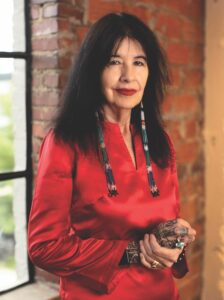
“We’d all rather be in person with Joy Harjo in a room,” says Raff. “But this certainly makes it more accessible.”
Harjo, a member of the Muscogee (Creek) Nation, was the first Native American U.S. poet laureate and only the second person to serve three terms in that position, from 2019 to 2022. She has written nine books of poetry and two previous memoirs about her life as a “poet-warrior” and has edited anthologies of Native American writing. She is a chancellor of the Academy of American Poets and chairs the board of directors of the Native Arts & Cultures Foundation.
Harjo’s new memoir covers her late-1960s youth, her life as a single mother, and being a “champion of Native nations.” Described as “a lyrical meditation about the why of writing poetry,” the book examines how poetry can lead toward justice and healing and express purpose, spirit, community, and memory.
The talk is presented through the library’s membership in the nationwide Library Speakers Consortium — which includes over 250 libraries in more than 40 states — and will be archived online along with other talks, including ones with authors John Irving, Ruth Ware, Rick Steves, and Amor Towles. See provincetownlibrary.org and libraryc.org for information. —Kathi Scrizzi Driscoll
The Met’s X: The Life and Times of Malcolm X at WHAT
A live screening of the Metropolitan Opera’s production of X: The Life and Times of Malcolm X will be shown at Wellfleet Harbor Actors Theater (2357 Route 6) on Saturday, Nov. 18, at 12:55 p.m. This is the second of nine screenings of the Met’s Live in HD 2023-24 season at WHAT.
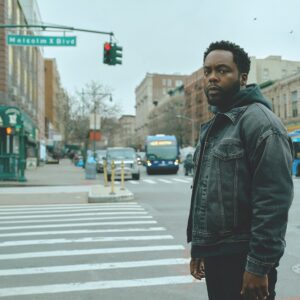
The opera, which premiered in 1986, is a family affair: Pulitzer-prize winning composer Anthony Davis wrote the music, and his brother Christopher Davis translated the life of civil rights leader Malcolm X for the opera’s storyline. Their cousin Thulani Davis wrote the libretto. The opera, in three acts, presents 12 scenes from its central character’s life. It begins with his childhood in the Depression-era Midwest when he was known as Malcolm Little. It ends with his violent death in New York City in 1965.
The staging has changed since the opera’s debut in 1986. Directed by Tony-nominated Robert O’Hara, the opera now “imagines Malcolm as an Everyman whose story transcends time and space,” according to the Met’s production notes.
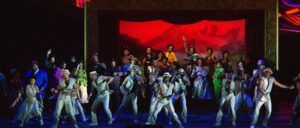
Sung in English, the opera features baritone Will Liverman as Malcolm X; soprano Leah Hawkins as his mother, Louise; mezzo-soprano Raehann Bryce-Davis as his sister Ella; bass-baritone Michael Sumuel as his brother Reginald; and tenor Victor Ryan Robertson as Nation of Islam leader Elijah Muhammad. Kazem Abdullah will conduct what the Met calls “a newly revised score, which provides a layered, jazz-inflected setting” for Thulani Davis’s original libretto.
Tickets are $17.50 to $29.50, including fees, at what.org. —Eve Samaha



